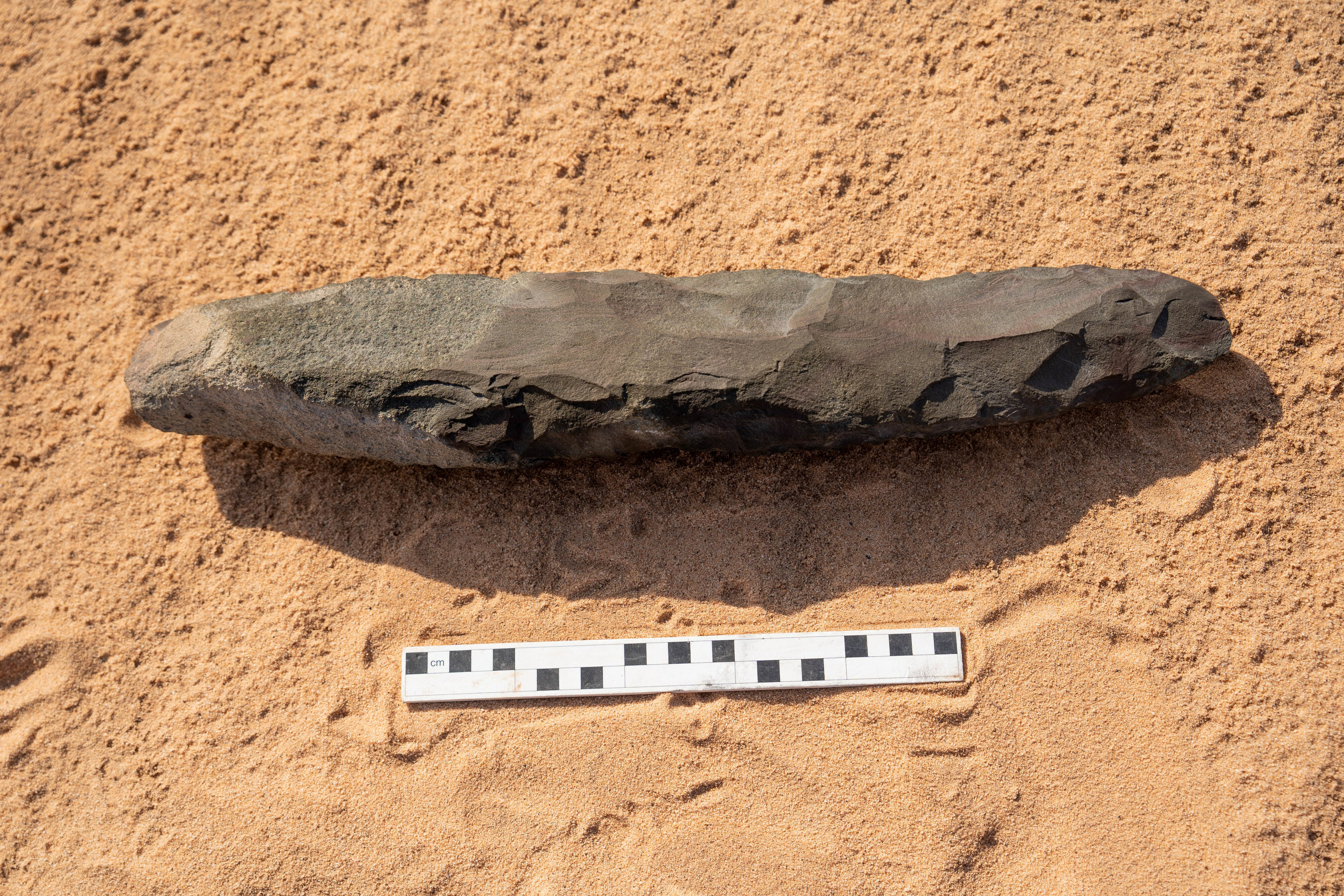- Fine-grained basalt tool is 51.3cm long and likely more than 200,000 years old
- Appears to be the world's largest 'hand axe' dating to the Lower-Middle Palaeolithic period
- Royal Commission for AlUla's research teams are continuing to unlock ancient mysteries
ALULA, Saudi Arabia, Nov. 7, 2023 -- A team of researchers working in AlUla, north-west Saudi Arabia, has discovered what is likely to be the largest stone 'hand axe' artefact found anywhere in the world. Initial field assessment suggests that this giant artefact dates to the Lower-Middle Palaeolithic period and is over 200,000 years old.
The hand axe was discovered by an international team of archaeologists working with The Royal Commission for AlUla (RCU), directed by Dr Ömer 'Can' Aksoy and Dr Gizem Kahraman Aksoy of TEOS Heritage. The team has been surveying a desert landscape to the south of AlUla, called the Qurh Plain, looking for evidence of human activity in antiquity.
The team has already been successful in discovering archaeological artefacts showing this forbidding land supported a vibrant community from the early Islamic period, and now the discovery of this rare and unique object promises to write a new chapter of human history in Arabia and beyond.
Made of fine-grained basalt, the stone tool measures 51.3cm long and has been worked on both sides to produce a robust tool with useable cutting or chopping edges. At this stage a function can only be guessed, but despite its size the tool fits comfortably in two hands.
The survey is still ongoing, and this find is only one of more than a dozen similar, though somewhat smaller, Palaeolithic hand axes that it has discovered. It is hoped that further scientific research will reveal more details about the origins and function of these objects and the people who made them, hundreds of thousands of years ago.
Dr Ömer Aksoy, Project Director, said: "This hand axe is one of the most important finds from our ongoing survey of the Qurh Plain. This amazing stone tool is more than a half a meter long (length: 51.3 cm, width: 9.5 cm, thickness: 5.7 cm) and is the largest example of a series of stone tools discovered on the site. An ongoing search for comparisons from across the world has not come up with a hand axe of equal size. As such this may well be one of the largest hand axes ever discovered."
In addition to this Qurh Plain Survey, RCU currently oversees 11 other archaeological specialist projects conducting fieldwork in AlUla and nearby Khaybar. This ambitious research programme is being conducted with the aim to further unlock the mysteries of antiquity in this region. This extraordinary discovery highlights how much there is still to learn about the human history of Saudi Arabia.
Archaeology is a vital element in RCU's comprehensive regeneration of AlUla County as a leading global destination for cultural and natural heritage.
The 12 archaeological missions underway during the fall 2023 season, from October to December, constitute one of the world's largest concentrations of archaeological research and conservation. The work will continue with additional missions planned in winter and spring 2024.
The fall 2023 season boasts a remarkable international gathering of more than 200 archaeologists and related cultural heritage specialists, representing experts from countries including Australia, France, Germany, Italy, the Netherlands, Saudi Arabia, Switzerland, Syria, Tunisia, Turkey and the UK. Many of the projects are a continuation of ongoing research, which has involved the training and mentoring of more than 100 archaeology students from Saudi Arabia.
In September, the inaugural AlUla World Archaeology Summit showcased AlUla's position as a hub of archaeological activity. The summit attracted more than 300 delegates from 39 countries and generated interdisciplinary conversations with the goal of connecting archaeology to wider communities.
About the Royal Commission for AlUla
The Royal Commission for AlUla (RCU) was established by royal decree in July 2017 to preserve and develop AlUla, a region of outstanding natural and cultural significance in north-west Saudi Arabia. RCU's long-term plan outlines a responsible, sustainable, and sensitive approach to urban and economic development that preserves the area's natural and historic heritage while establishing AlUla as a desirable location to live, work, and visit. This encompasses a broad range of initiatives across archaeology, tourism, culture, education, and the arts, reflecting a commitment to meeting the economic diversification, local community empowerment, and heritage preservation priorities of the Kingdom of Saudi Arabia's Vision 2030 programme.
About TEOS Heritage
Based in Izmir, Turkey, Teos is an independent heritage consultancy specialising in Western Asia. TEOS provides archaeological and architectural advice and guidance, along with a wide range of heritage assessment work and site surveys. Its particular skills are in archaeological fieldwork, recording of heritage sites, preparation of reports and publications, and heritage management strategies.
This News is brought to you by Qube Mark, your trusted source for the latest updates and insights in marketing technology. Stay tuned for more groundbreaking innovations in the world of technology.









